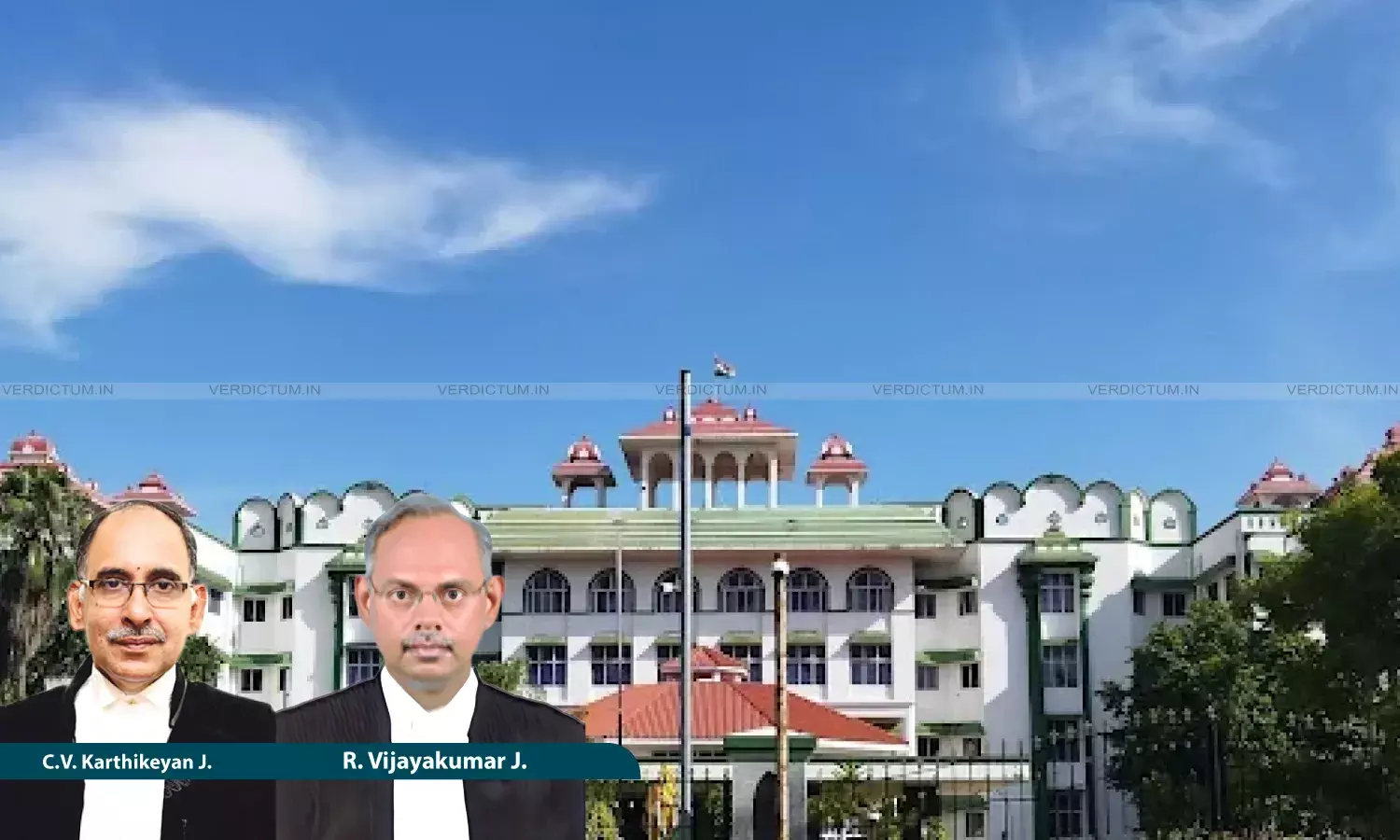Threatening & Abusing Branch Manager Reflects Direct Insubordination: Madras High Court Upholds Conductor’s Dismissal
The widow of the writ petitioner approached the Madras High Court, challenging a Single Bench order upholding the order of punishment.

Justice C.V. Karthikeyan, Justice R. Vijayakumar, Madras High Court, Madurai Bench
While upholding an order of dismissal of a conductor employed with Tamil Nadu State Transport Corporation, the Madras High Court observed that the dismissed employee may be described as having a proclivity for threatening and abusing the Branch Manager, which reflects direct insubordination and extreme disrespect towards an officer holding a managerial position.
The widow of the writ petitioner approached the High Court, challenging a Single Bench order upholding the order of punishment.
The Division Bench of Justice C.V. Karthikeyan and Justice R. Vijayakumar held, “We are of the firm view that the punishment imposed was certainly not disproportionate, particularly, when taking into consideration the past disciplinary record of the writ petitioner. Specifically, there were prior occasions of similar misconduct of threatening and abusing the Branch Manager, each resulting in punishment being imposed of cut in increment for one year without cumulative effect. The petitioner may be described as having a proclivity for threatening and abusing the Branch Manager, which reflects direct insubordination and extreme disrespect towards an officer holding a managerial position.”
Advocate V.Ajay Khose represented the Appellant while Government Advocate V. Om Prakash represented the Respondent.
Factual Background
The Writ Petition had been filed by the petitioner seeking issuance of a Writ of Certiorari, to call for the records relating to the file of the Labour Court and to quash the Award. The writ petitioner was employed as a Conductor in the Tamil Nadu State Transport Corporation at Karaikudi. It was alleged that he had trespassed into the cabin of the Manager, threatened him, and also attempted to assault him. A complaint was lodged, and following due procedure, disciplinary proceedings were initiated. An Enquiry Officer was appointed, and the petitioner participated in the enquiry proceedings. A report was submitted, finding that the charges were proved. Though a further notice was issued to the writ petitioner, he did not choose to respond to the same. Consequently, an order of dismissal from service was passed against him.
The writ petitioner subsequently raised an industrial dispute before the Labour Court at Madurai. The Labour Court held that the charges against the writ petitioner had been established and consequently, awarded the punishment of dismissal from service. When the matter reached the Single Judge Bench of the High Court, the punishment of dismissal from service was upheld.
Reasoning
The Bench noted that the writ petitioner had been charged with similar offences of misconduct against the Branch Manager on two earlier separate occasions, for which he was punished with a cut in increment for one year without cumulative effect on both occasions. Additionally, there were two other earlier instances wherein the petitioner was charged with remitting shortage of the amount collected while performing his duties as a Conductor in the Transport Corporation bus. On the first occasion, he was severely warned, and on the second occasion, he was punished with a cut in increment for one year without cumulative effect.
“The compelling circumstance of previous misconduct of similar nature on two occasions necessarily had to be taken into account by the second respondent when determining the appropriate punishment for the repeated offences involving abusive and threatening conduct against the Branch Manager. The Labour Court duly considered the issue of proportionality of the punishment and held that the punishment was not disproportionate under the circumstances”, it stated.
It was further noticed that the writ petitioner did not respond to the second show cause notice and raise any mitigating circumstances regarding the quantum of punishment. “The contention that the writ petitioner was victimized due to his membership in a Trade Union must be rejected. Being a member or office bearer of a Trade Union does not entitle him to abuse and threaten the Branch Manager on not one or two, but on three separate occasions. We hold that the punishment imposed was not disproportionate, considering the petitioner’s past conduct and the nature of the allegations, which were found to be proved during the enquiry”, it held.
Thus, in light of such facts and circumstances, the Bench dismissed the Petition.
Cause Title: A.Shanthi v. State of Tamil Nadu (Case No.: W.A.(MD)No.457 of 2020)
Appearance
Appellant: Advocates V.Ajay Khose, A.Rahul
Respondent: Government Advocate V. Om Prakash, Advocates P.Balasubramanian

